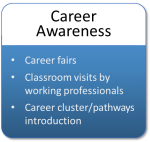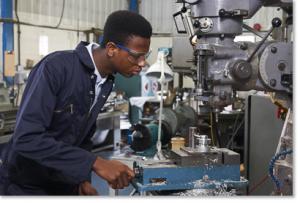Lesson Introduction
Career Development Process
Career Awareness Stage
In school, students learn about the world of work, assess their interests and skills, and discover a wide range of career options they may not have known existed. Teachers can invite guest speakers to the classroom or schools may hold career fairs to help students develop career awareness. Students can also learn about career clusters and pathways offered in Texas schools.
In Texas, there are two courses at the middle school level designed to help students develop an awareness of possible careers within a chosen career pathway:
Click each course title below to learn more.
Career Exploration Stage
During the career exploration stage, students may interview professionals in careers they are interested in as part of class projects or visit companies to learn more about different opportunities. Students may also view videos to learn more about their fields of interest and what those careers entail. They may also participate in job shadowing or mentoring opportunities.
Career Exploration – Job Shadowing
Job shadows are usually for a couple hours or up to a couple days. The student is not paid and does not perform any work during the experience. To be an effective learning experience, the person the student is shadowing must be a competent worker who models the characteristics of a good employee.
Career Exploration – Mentoring
Mentoring is a one-on-one relationship between an experienced professional and a less experienced person or a student. In this relationship, the mentor guides the mentee (or protégé) with the goal of helping the mentee create a path to or reach professional goals.
The mentoring relationship usually lasts for an extended period of time which could range from several months to several years.
Career Preparation Stage
Career preparation is the stage in which students gain the knowledge and skills for their career pathway. In this third stage of career development, they get hands-on experience often participating in work-based learning (WBL) and other on-the-job training (OJT) opportunities.
OJT refers to any type of training that takes place at a worksite while the trainee is performing the actual job under the supervision of an experienced worker. In the career preparation stage, many opportunities include components of OJT, giving the students substantial experience to pursue their career pathway after graduation.
On the next screens, you will learn about some of the types of career preparation programs are available and how WBL fits into this stage.
Career Preparation – Internship
Internships usually involve three parties, each with a different interest in the relationship.
Click on each party below to learn more.
Career Preparation – Apprenticeships
Career Preparation – WBL
WBL experiences are part of the career preparation stage. This is where students gain hands-on experience in an authentic workplace.
A written arrangement between the school and an employer outlines expectations and supervision requirements for both parties.
The student may attend school and work on alternating days or attend school for a half day, then proceed to work. Schools and employers work with the student to determine the best schedule for the student’s success.
Career Preparation – Community Service/Volunteer Work
Another method of career preparation is community service and volunteer work. Students can gain valuable experience, explore career opportunities, and gain skills directly related to their career path by volunteering with non-profit or government organizations.





